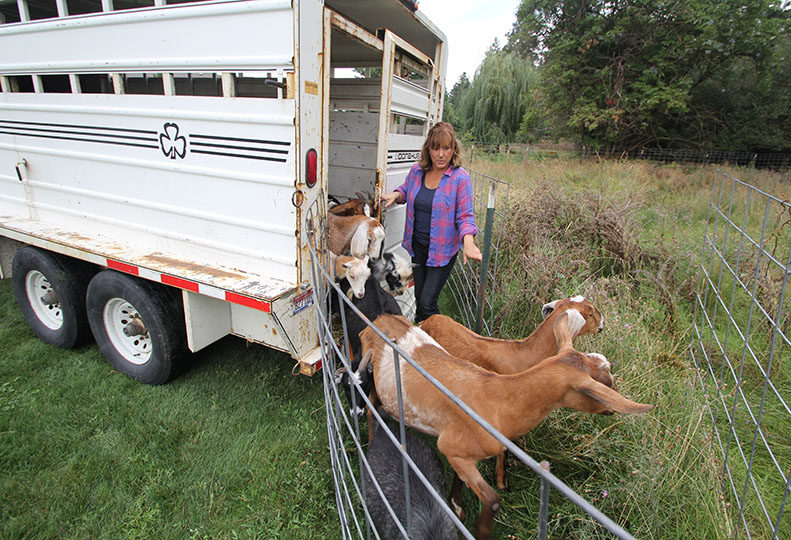
Home » Four-legged weed control
Four-legged weed control
Hayden businesswomen rents out goat herd to mow down invasive vegetation

September 12, 2013
Suzanne Forte has about 50 fuzzy workers with names like Buzz and Gizmo who are plenty willing to work for weeds. Not the kind of weed that's in the news lately, but the stubborn, noxious, and invasive stuff that's so hard to get rid of, like spotted knapweed, leafy spurge, and Canada thistle.
Forte owns Green Goat Rentals, of Hayden Lake. She describes the business as a green alternative to chemical and mechanical landscape management.
Her worker goats chomp their way through unwanted vegetation in environmentally sensitive areas, rugged terrain, and even a few residential properties.
"It's a good alternative in areas that people can't mow, like rocky areas," she adds.
In a few days, the goats can make a sizable patch of overgrown weeds and brush look more like a freshly mowed lawn.
The cities of Coeur d'Alene and Liberty Lake are her biggest clients, booking goats from around Memorial Day to past Labor Day.
"I'm basically working for two cities," Forte says. "It keeps me busy."
Between municipal jobs, Green Goat Rentals picks up smaller jobs for residential and commercial properties. Green Goat Rentals is scheduled out a month in advance.
"I turn down a lot of work. If someone calls me in June and wants something right away, the goats are more than likely booked," she says. "At certain times I have a week or two available in between a city job, but if someone wants a big project done, they have to book preseason."
In Liberty Lake, the goats nip noxious weeds in the proverbial bud on the city's undeveloped land, such as the edges of its city parks.
In Coeur d'Alene, the hungry critters clean up weeds around the city's drinking-water wells and tanks.
Unlike some birds and other animals that eat certain seeds, goats don't spread weeds via their droppings, Forte says.
"When goats eat weeds, the seeds come out sterile," she says. In Coeur d'Alene and Hayden, annual goat treatment is making progress by reducing weeds' ability to reproduce through reseeding.
"Each year the goats are taking less time at each site," she says.
While goats might be in vogue because they're seen as an environmentally friendly option for weed control, Forte says people have been using goats in land management for a long time on a larger scale.
"People with large amounts of property are going to need a lot of goats," she says. "I do more properties that are 5 acres and under."
Forte first used goats to control weeds on her land in Hayden.
"I fell into the business because I wanted a solution to knapweed on my property six years ago," she says. "Then I started renting them for weed and brush control."
She says Green Goat Rentals is a sole proprietorship, and she's the business's main human employee.
Forte transports goats with a stock trailer throughout the Spokane area and North Idaho, then makes daily rounds to ensure they're healthy, have fresh water, and fences are holding them on the jobsite.
"I do most of the work, and family members help me," she says. "Sometimes, if a job requires a lot of fencing, I hire labor out."
Her husband Paul Forte heads 40 Equipment Rentals, of Hayden, which rents out lawn, garden, and farming machinery and equipment.
"My husband wasn't too thrilled about the goats," she says. "I told him we could rent them out. Now, he's convinced."
In its first year of operation Green Goat Rentals had 15 goats and most of its jobs were in fenced back yards and small properties.
In Green Goat Rentals' second year, she presented a proposal to the city of Coeur d'Alene's water department for the goats to eradicate weeds around the city's wellheads.
Since then Green Goat Rentals has worked for the water department, bringing 20 to 25 goats to every site annually, Forte says.
In a typical job, the goats take up to a week to mow down a heavily overgrown half-acre of land, before she moves them to the next site, she says.
Green Goat Rentals' base rate is $2.25 per goat per day.
"The more goats on a job, the quicker it will go," Forte says.
When the landowner is willing to participate in fencing, monitoring, and caring for the goats, she charges a reduced rate of $1.50 per goat per day.
Most of the goats are pygmy and pygmy crosses that Forte obtains through a variety of sources. Some are old high school rodeo goats. Others were raised as 4-H stock. The goats weigh between 30 and 100 pounds. They average about 50 pounds, and each goat eats about a third of its weight in weeds a day, Forte says.
"The bigger the goat, the more it eats," Forte says, adding that larger goats are more difficult to manage, so she prefers smaller pygmy breeds.
The goat-rental business here comes to a halt in winter, although Forte has leased some of Green Goat Rentals workers on the West Side.
"It's a seasonal business here," Forte says. "In the Seattle area, it's more of a year-round thing."
In the winter here, the goats need supplemental hay and oats, shelter, and fresh water.
"They don't like rain or snow," she says.
The goats are industrious enough in the working season, however, to earn their keep through the off-season, she says.
Up Close
Related Articles





_web.jpg?1729753270)